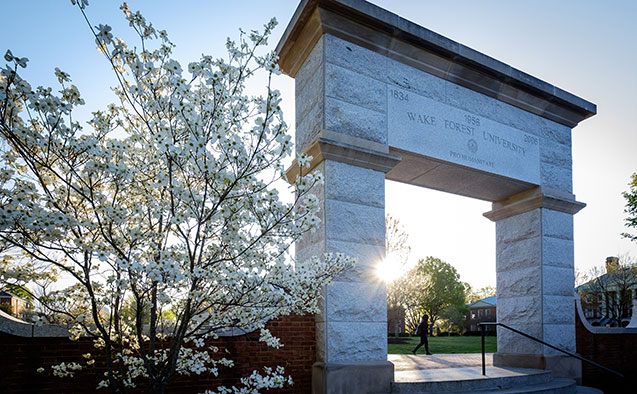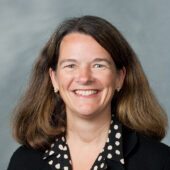President Susan R. Wente joins 60 college presidents to advance civic preparedness

Wake Forest University President Susan R. Wente is joining 60 other college presidents of diverse institutions from across the country to advance higher education’s pivotal role in preparing students to be engaged citizens and to uphold free expression on campus.
Through College Presidents for Civic Preparedness, a unique consortium designed by the presidents and convened by the Institute for Citizens & Scholars, participating presidents are dedicated to preparing the next generation of well-informed, productively engaged, and committed citizens; defending free expression, civil discourse, and critical inquiry as essential civic norms; and increasing thoughtful engagement and better understanding by students for the effective functioning of our democracy. The consortium, first announced with 15 members in August 2023, has grown significantly, demonstrating momentum for this movement.
“Wake Forest is committed to graduating leaders with integrity and courage, across disciplines and professions, who embrace evidence-driven debate, open dialogue and critical thinking,” said Wake Forest University President Susan R. Wente. “Universities play an essential role in cultivating civic engagement. Our goal is to prepare students to address the most difficult and controversial questions of our time, while remaining grounded in respect for one another and recognition of our shared humanity.”
Participating presidents will ensure campus-specific and collective actions reflect three shared Civic Commitments:
- Educating for democracy is central to our mission.
- We will prepare our students for a vibrant, diverse, and contentious society.
- We will protect and defend free inquiry.
Taken together, these commitments embrace both free speech and diversity, two values often pitted against each other, by instead emphasizing meaningful engagement and inquiry with different voices and viewpoints. The commitments stress diversity as a strength of both American democracy and campus life and affirm the truth-seeking role of higher education through curiosity and inquiry. They also enable campus leaders to take substantive action to promote democratic engagement among students, with public accountability for progress through publication of an annual impact report.
With their campus leadership, presidents are supporting campus-specific programming to advance the Civic Commitments in 2024, including new courses, outside speakers, student orientations, presidential speeches, technology tools, and voter education initiatives. A complete listing appears on the consortium website. At Wake Forest related programs include:
Deacon Dialogues
Wake Forest is facilitating Deacon Dialogues: Let’s Talk, a new initiative for students through the Office of Civic & Community Engagement. Dialogues, which include student facilitators, are being held on a variety of topics related to identity, politics, and current issues utilizing an issue guide. The intent of these dialogues is to provide space for broadening perspectives, expressing paradox and ambiguity, listening to understand, and find places of agreement. As an example, earlier this year a dialogue was held on political polarization.
Principled Pluralism Fellowship
The Principled Pluralism Fellowship provides students with the opportunity to develop the knowledge, research skills, and civic capacities needed to engage difference with empathy, integrity, and purpose. Embedded in Wake Forest’s Program for Leadership and Character, the Fellowship aims to support students in the summer (including a stipend, housing, supplies for materials, and mentorship) who pursue research on principled pluralism, write a joint white paper on its importance, and organize a campus event to promote meaningful dialogue across difference.
Civic Scholars
The Civic Scholars program recognizes, connects, and develops civic-minded students whose work in the community is both deep and broad. Scholars are leaders on campus and in the community and are connected to a range of causes and organizations. Throughout their time at Wake Forest, scholars participate in workshops and complete work across three key areas: academics, direct service, and leadership development.
Wake Washington Center
The vision of the Center is to raise the profile and tangible presence of Wake Forest University in Washington, D.C. and have a discernible role in the national conversations on the policies, laws and central issues facing this country and our world. Our presence is grounded by academic programs and is fortified by more than 9,000 Wake Forest alumni, parents and friends who live and work in the Washington area. By building a bridge between the nation’s capital and the campus in Winston-Salem, Wake Forest is able to forge a pathway for students and alumni to live out Pro Humanitate on the national and global stage.
In addition to championing these commitments on our own campuses, the presidents will undertake together and through the Institute a set of collective actions:
- Meet regularly and confidentially for peer learning and the exchange of information, ideas, practices, and tools, including on such topics as the 2024 elections and student activism;
- Help faculty engage effectively with free expression and civil discourse in the classroom by participating in the Faculty Institute on Dialogue Across Difference; and
- Create and seize opportunities for shared advocacy and public outreach on civic preparedness in higher education.
“Higher education has a responsibility to provide students with critical civic skills and knowledge to participate effectively in our constitutional democracy,” said Rajiv Vinnakota, President of the Institute for Citizens & Scholars, a nonprofit that cultivates talent, ideas, and networks that develop young people as effective, lifelong citizens. “College campuses are among the most diverse spaces in our country, and college is an important time for students to develop the habits, practices, and norms to live in a multicultural and interconnected democracy. Doing so can create a ripple effect, making young people more optimistic and increasingly committed about their future and our nation.”
College Presidents for Civic Preparedness has been supported by ECMC Foundation, Einhorn Collaborative, John S. and James L. Knight Foundation, One8 Foundation, Arthur Vining Davis Foundations, Lumina Foundation, Charles Koch Foundation, and Teagle Foundation, with individual campuses providing support for their own related projects.
Categories: Top Stories
Wake Forest News
336.758.5237
media@wfu.edu
Meet the News Team
Headlines
Wake Forest in the News
Wake Forest regularly appears in media outlets around the world.




